This piece is part of a series titled “Nonstate armed actors and illicit economies in 2024” from Brookings’s Initiative on Nonstate Armed Actors.
Over the past three decades, the Primeiro Comando da Capital (PCC) has transformed from a prison gang founded in São Paulo into a transnational criminal “leviathan,” with a presence throughout South America, Africa, and Europe. In response to this growing threat, in 2021 the U.S. government cited the PCC as “the most powerful organized crime group in Brazil and among the most powerful in the world.” What can we expect from the PCC moving forward? And how might policymakers stall this international expansion?
In the coming year, the PCC will likely continue to vie for dominance in strategic areas of contested control throughout Brazil and look for opportunities to consolidate gains abroad. Confrontation with rival groups, including the Comando Vermelho (CV), born in the Rio de Janeiro prisons, and its allies in areas such as the Amazon, is also likely to continue. This is particularly the case due to the region’s importance for drug smuggling and access to other illicit markets, such as illegal logging, mining, and wildlife trade.
Internationally, the PCC is likely to become further entrenched in neighboring countries and continue to probe opportunities for a direct presence in Europe, while at minimum maintaining profitable links to groups such as Italy’s ‘Ndrangheta mafia. A more focused push into other parts of South America, including Uruguay, Argentina, and Chile, where prison capacity and experience fighting organized crime is limited, could propel the PCC’s consolidation of power in the region as well.
In considering the nature of the PCC’s growth, addressing this challenge will require both domestic policy changes and international coordination. Within Brazil, continued focus on hotspot areas, such as the Amazon, will be vital. In addition, the Lula administration should devise a federal strategy for addressing organized crime, which has typically been left to state authorities despite the national-level threat.
To address the PCC’s transnational expansion, Brazilian security personnel should deepen their collaboration with regional partners around organized crime. This issue could also provide an opportunity for the Brazilian government to engage in productive collaboration with the United States and the European Union, particularly as the PCC endeavors to expand overseas into areas where Brazilian intelligence operations are less robust.
Beyond these approaches, it remains important to address longstanding challenges that make cooperation with or participation in criminal groups an attractive option. These include efforts limiting pretrial detention, improving prison conditions, and addressing impunity within the security apparatus, among a range of other possible reforms.
The PCC’s continued expansion throughout Brazil
Born in 1993 in response to a brutal massacre in Carandiru prison in São Paulo, the PCC has since expanded to become a formidable global threat. With a presence in nearly every state in Brazil, the PCC has recruited tens of thousands of members, drawing on a prison population that has grown by more than 400% since 2000. Only the CV has a similar national scale, and in recent years, the PCC has wrestled control away from it in many parts of Brazil.
The PCC exerts control inside Brazil’s prisons and outside its walls, overseeing a complex governance system that involves not only explosive violence but also the imposition of discipline and order. In recent years, the PCC has pushed into the Amazon, where groups such as the Família do Norte and CV have historically vied for control. This contestation has resulted in high homicide rates and prison violence. Due to the fact that the Amazon offers the greatest potential for illicit activities — with proximity to suppliers in the northwest, transport routes to ports in the northeast, vulnerable migrants from countries such as Venezuela in the north, and the potential for expansion into environmental crimes, such as illegal mining and fishing — it is likely to remain an area of PCC interest over the next year.
The PCC’s transnational agenda
Since the mid-2000s, the PCC has also pursued transnational ties. In addition to providing a steady supply of marijuana and cocaine to fuel domestic markets, this expansion seeks to stitch together all aspects of the drug supply chain, with Brazil’s roads, rivers, and ports providing the transport routes to the Atlantic Ocean. To this end, the PCC has linked drug producers in countries such as Bolivia, Peru, and Paraguay to drug suppliers across Europe and parts of Africa. It also worked to recruit former FARC fighters who opted out of peace talks with the Colombian government. Through trans-Atlantic ties with Italy’s ‘Ndrangheta mafia and in West Africa, the PCC serves as an important intermediary for cocaine supplied to Europe.
For now, the PCC tends to plug into and collaborate with existing international networks, yet there is evidence the group may establish more robust local presences as well. According to some estimates, PCC members have been identified in at least 16 countries, including an estimated 1,000 affiliates alone in Portugal. Continued collaboration with other illicit actors operating in parts of Europe and Africa is likely to remain a priority for the PCC, but efforts to build a presence on the ground, particularly in Lusophone countries, seem increasingly possible as well.
Lula’s approach to organized crime
According to pollster Datafolha, respondents consistently rank public safety in Brazil as a major problem. As a result, any eruptions in violence could dent Brazilian President Luiz Inácio Lula da Silva’s approval ratings and push voters toward more extreme politicians promising policies akin to those seen in El Salvador.
To address this concern, Lula has attempted to reign in organized crime in a variety of ways. In the Amazon, he has worked to bolster cross-national coordination to protect the rainforest. Although regional integration is a positive step, some critics have argued that these efforts do not go far enough in addressing environmental crimes.
Security personnel have also sought to decrease illegal logging and mining, with some success. However, there are already signs that lax enforcement has brought a resurgence in illicit activities to the very areas that the Lula administration had prioritized last year. Furthermore, tensions in Congress tied to support for large regional development projects and agricultural expansion threaten to stymie further progress and drive illicit activity.
Beyond the Amazon, Lula has retightened firearm restrictions, reversing policies that made it easier for criminal groups to procure weapons legally. Other efforts, however, amount to little more than new funding for the same ineffective solutions. For example, the government recently announced the deployment of the armed forces to key ports and airports to reign in drug smuggling. This “guarantee of law and order” may lead to more drug apprehensions in the short term, but the root causes driving PCC expansion will remain intact.
Denting the PCC’s reach
Brazil continues to have one of the highest prison population rates in the world and the third-highest number of prisoners. Prison occupancy levels are about 174%. As a result, any type of sweeping mass incarceration efforts to curb organized crime would likely be counterproductive in Brazil, particularly given the PCC’s prison-based origins.
Instead, efforts to improve conditions in prisons and decrease the prison population will help alleviate stress on a system that provides the best opportunities for PCC recruitment. Most recently, the National Council of Justice reviewed the cases of over 100,000 inmates and found that nearly 22,000 had been wrongfully imprisoned, resulting in their release. Further efforts in this vein will be vital. Additionally, investing more in rehabilitation programs and security so that inmates are not forced to rely on gangs for their survival will also help decrease the pull factors inside Brazil’s prisons that drive PCC membership.
Given the PCC’s wide reach across Brazil — and internationally — cooperation and intelligence sharing also remain critical. At present, Brazilian states remain responsible for public safety, and the Brazilian federal government’s responses have so far been limited. As a result, it is difficult to coordinate across security operations, despite a national-level threat. A national-level strategy that facilitates communications and sets priorities could help create a long-term response to public safety threats that extend well beyond state borders.
Internationally, coordination efforts could provide opportunities for productive collaboration with the United States and, the European Union due to the PCC’s expansion into areas where the Brazilian government’s intelligence efforts and relationships are weaker. It will also be critical to continue to invest in additional regional cooperation and capacity building, particularly in countries like Paraguay and Bolivia, where the ability to investigate organized crime is limited and law enforcement is corrupt.
More broadly, improving the public safety situation will require difficult reforms to tackle impunity within the security apparatus and regain the trust of populations that have historically been neglected by the state. Homegrown solutions, such as improvements in data usage to map crime or limitations on alcohol sales after 11 p.m., offer a blueprint for strategies that have worked — however, they take political will and time to succeed. In the interim, punitive solutions — which trade short-term political wins for long-term public safety — will likely exacerbate the PCC’s transnational challenge.

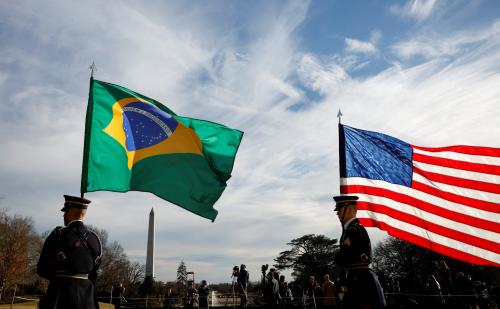
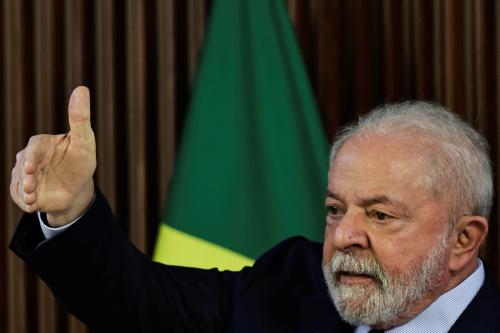
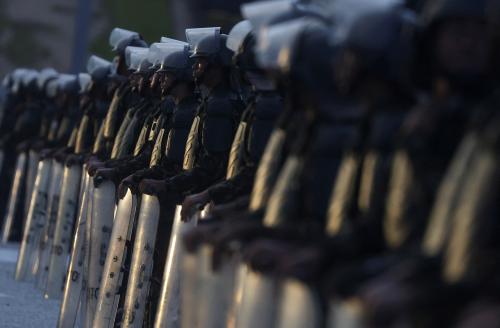
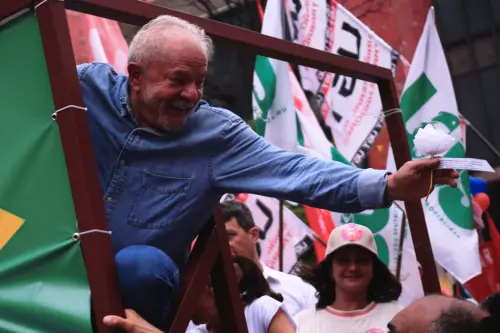
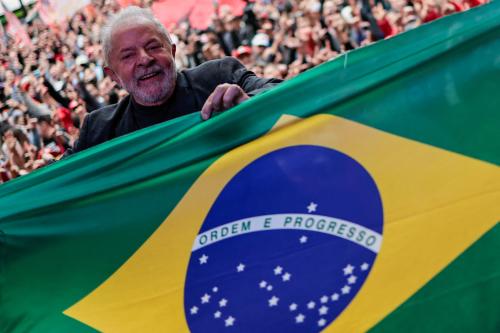
Commentary
The internationalization of organized crime in Brazil
January 24, 2024